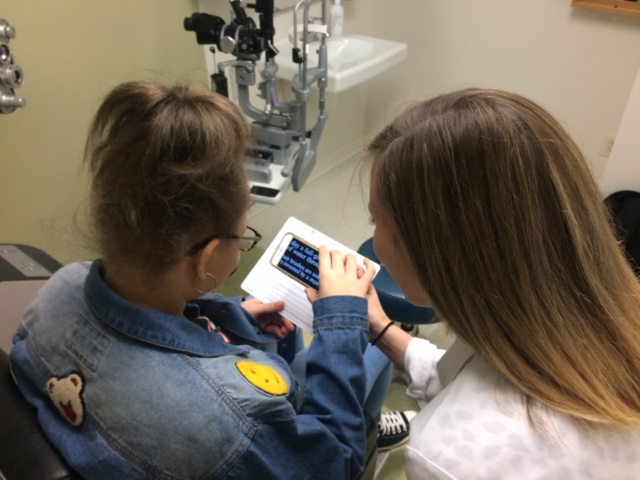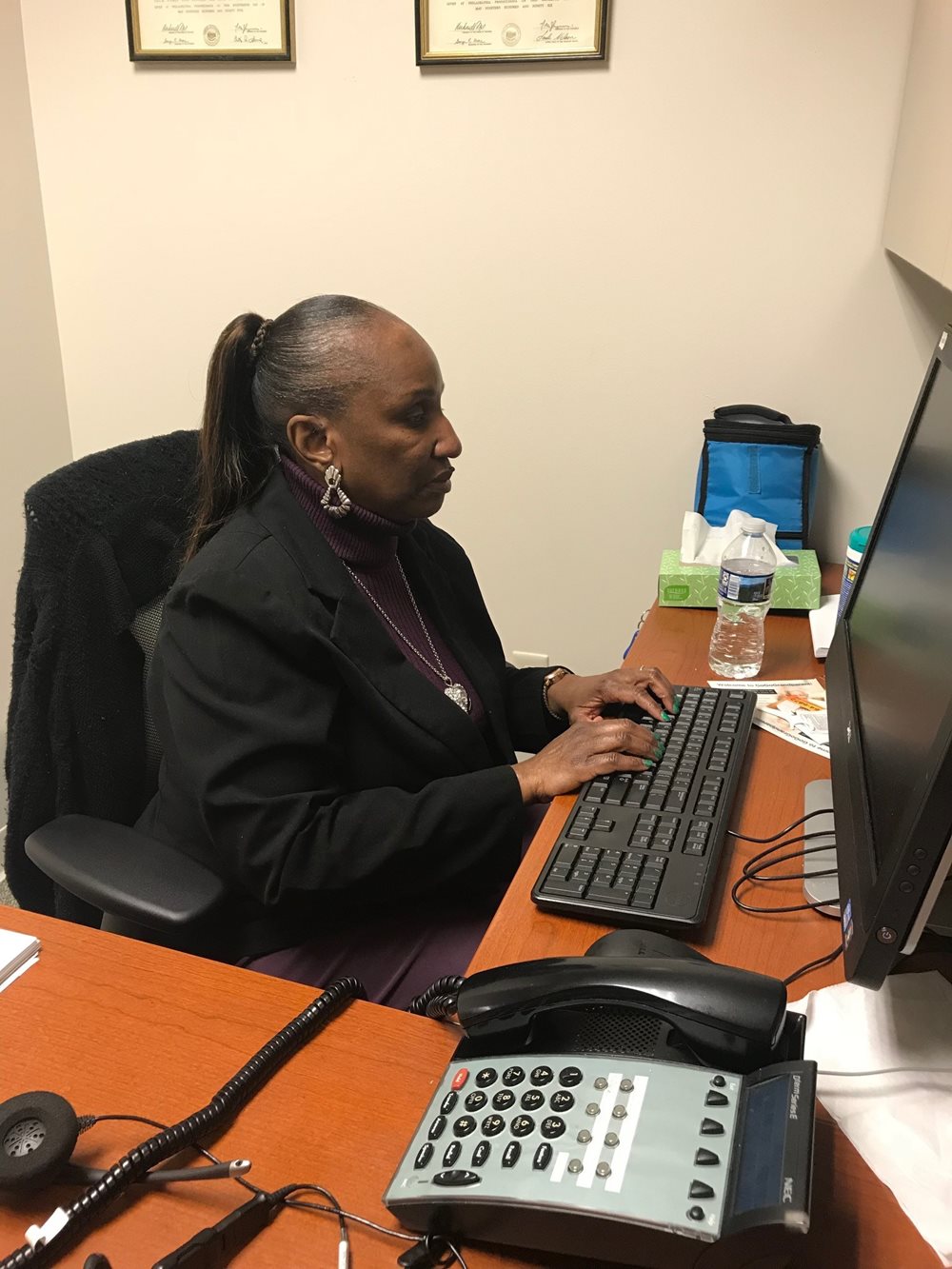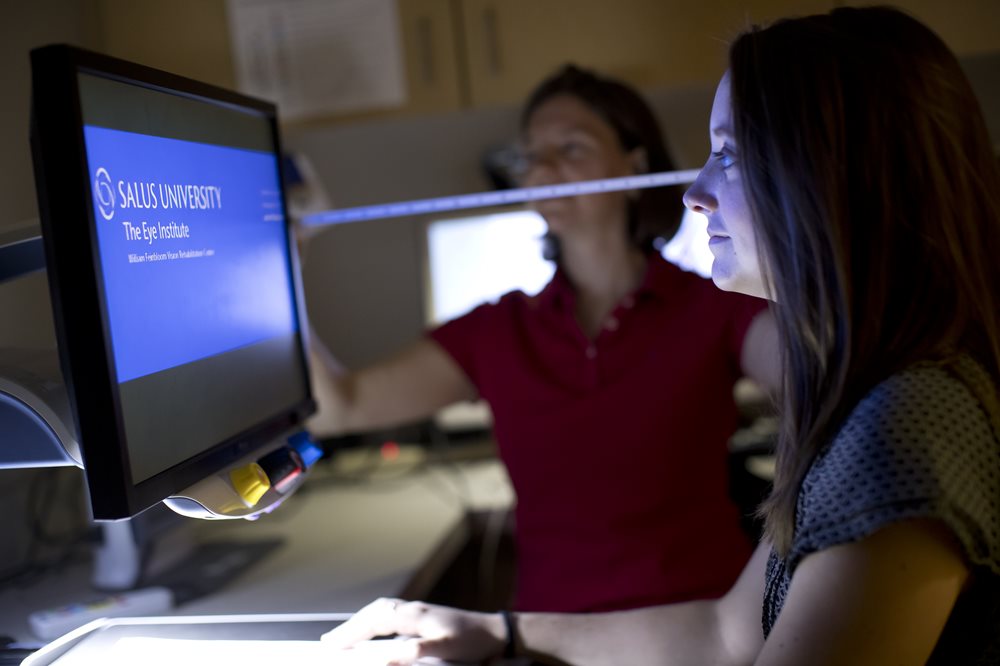A Team-Based Approach to Low Vision Care
 Author and leadership expert John C. Maxwell once said, “Teamwork makes the dream work.” No place is the saying more true than at the William Feinbloom Vision Rehabilitation Center. Housed in The Eye Institute’s Oak Lane campus, the Feinbloom Center provides specialized vision and rehabilitative services to patients with blindness and low vision. Much like a sports team, each staff member plays a different position, but the end result is the same: to help patients accomplish their visual goals.
Author and leadership expert John C. Maxwell once said, “Teamwork makes the dream work.” No place is the saying more true than at the William Feinbloom Vision Rehabilitation Center. Housed in The Eye Institute’s Oak Lane campus, the Feinbloom Center provides specialized vision and rehabilitative services to patients with blindness and low vision. Much like a sports team, each staff member plays a different position, but the end result is the same: to help patients accomplish their visual goals.
A patient with low vision is someone whose eyesight is diminished to the point where they have difficulty performing everyday tasks such as reading, writing, watching television and cooking. The Feinbloom Center’s interdisciplinary team works together to help patients regain those lost skills.
On average, the team at the Feinbloom Center sees anywhere from six to 10 patients each day and the team-based approach begins before patients even walk in the door. Prior to their first appointment, each patient is assigned to a social worker. The social worker is the initial contact, and records a brief health history with the patient, which also includes finding out their overall goals.
 “We focus a lot on patient goals because that’s really important,” said Virginia Scott, social worker at the Feinbloom Center. “We need to know what the patient hopes to accomplish so that we can work together to help make that happen.”
“We focus a lot on patient goals because that’s really important,” said Virginia Scott, social worker at the Feinbloom Center. “We need to know what the patient hopes to accomplish so that we can work together to help make that happen.”
Scott, who is legally blind herself, is more than just a social worker. She and her colleagues also serve as advocates, referring patients to other services and resources that may be helpful.
“We don’t want anyone to leave here without their needs being met,” Scott said. “Whatever it takes to help patients maintain their quality of life, we are here for them.”
Optometric interns from Salus University’s Pennsylvania College of Optometry (PCO) are also key members of the Feinbloom Center team. They start the patient’s eye exam and then present their findings to the on-site optometrists. After a more comprehensive review of the patient’s medical history and eye exam results, the optometrists will evaluate the patient’s treatment goals more in-depth.
Low vision resident Dr. Christin DeMoss helps oversee the interns and also works with the rest of the team to create individualized treatment plans for patients. A former PCO student herself, her residency allows her to connect with patients in a different way.
“As a student I got to see the patients once and if I was lucky I got a chance to see them again when they came in for a follow up,” said Dr. DeMoss. “As a resident, I have the opportunity to see their full progress from start to finish.”
Certified low vision therapists are the last but equally important members of the Feinbloom Center team. The therapists provide patients with low vision rehabilitation and also teach them how to utilize their prescription devices.
 “Sometimes the device has already been prescribed and it’s a matter of training the patient in how to use it but other times we have to do an assessment to see what devices could best help the patient maximize the vision that they have left,” said Kerry Lueders, MS, COMS, TVI, CLVT, certified low vision therapist at the Feinbloom Center.
“Sometimes the device has already been prescribed and it’s a matter of training the patient in how to use it but other times we have to do an assessment to see what devices could best help the patient maximize the vision that they have left,” said Kerry Lueders, MS, COMS, TVI, CLVT, certified low vision therapist at the Feinbloom Center.
The devices that therapists use vary depending on the patient’s need - some of the most commonly prescribed low vision devices include strong prescription glasses, video magnifiers, telescopes, text-to-speech technologies and mobile apps.
“We introduce these technologies in order to give patients strategies, whether visual or auditory, that will help them maintain their independence as much as they can,” said Lueders.
No matter what position, helping patients accomplish their goals and maintain their independence is the main goal shared by each member of the Feinbloom Center team.
“I can do my part and then pass the baton to the next member of the team who can do their part as well,” said Dr. DeMoss. “It’s a team effort all around and it helps us provide the best possible care for patients.”
Dr. Erin Kenny, chief of the Feinbloom Center, attributes the expertise of the staff and the team-based approach to patient care as a distinct feature that sets this center apart from other low vision practices.
“From the interns to the residents, doctors, social workers and rehab specialists – we’re an interdisciplinary team and we all depend on each other,” said Dr. Kenny. “Everyone brings their own unique expertise and each person plays such a big part in our overall success.”